The global differential pressure casting machine market is valued at USD 279.9 million in 2025 and is set to reach USD 406.4 million by 2035, recording an absolute increase of USD 126.5 million over the forecast period. This translates into a total growth of 45.2%, with the market forecast to expand at a compound annual growth rate (CAGR) of 3.80% between 2025 and 2035. The overall market size is expected to grow by approximately 1.5X during the same period, supported by increasing demand for lightweight automotive components, growing adoption of precision casting technologies, and rising requirements for high-quality metal forming systems across automotive, aerospace, machinery manufacturing, and industrial production sectors.
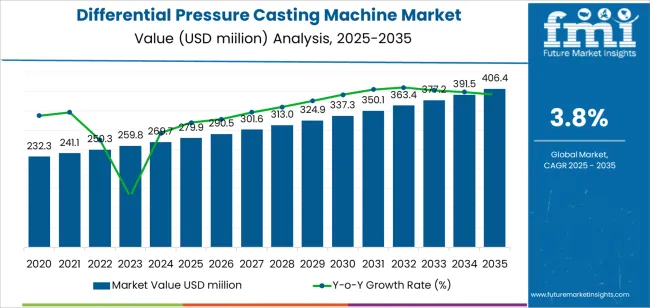
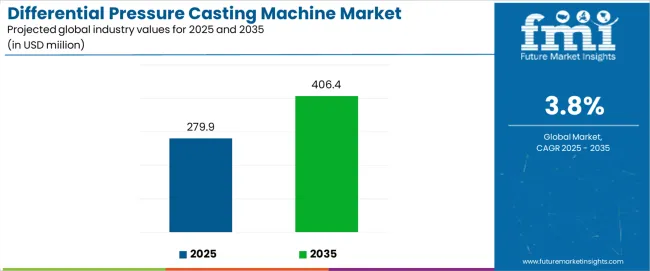
Differential Pressure Casting Machine Market Key Takeaways
| Metric | Value |
|---|---|
| Estimated Value in (2025E) | USD 279.9 million |
| Forecast Value in (2035F) | USD 406.4 million |
| Forecast CAGR (2025 to 2035) | 3.80% |
Between 2025 and 2030, the differential pressure casting machine market is projected to expand from USD 279.9 million to USD 340.2 million, resulting in a value increase of USD 60.3 million, which represents 47.7% of the total forecast growth for the decade. This phase of development will be shaped by increasing demand for precision lightweight components, rising automotive electrification enabling advanced casting techniques, and growing availability of automated manufacturing technologies across metal forming operations and industrial casting facilities.
Between 2030 and 2035, the market is forecast to grow from USD 340.2 million to USD 406.4 million, adding another USD 66.2 million, which constitutes 52.3% of the overall ten-year expansion. This period is expected to be characterized by the advancement of smart process control systems, the integration of digital monitoring for quality assurance, and the development of premium casting capabilities across diverse manufacturing applications. The growing emphasis on production efficiency and material optimization will drive demand for advanced machine varieties with enhanced precision capabilities, improved automation characteristics, and superior casting performance profiles.
Between 2020 and 2024, the differential pressure casting machine market experienced moderate growth, driven by increasing automotive lightweighting initiatives and growing recognition of differential pressure technology's effectiveness in delivering superior casting quality across automotive and aerospace applications. The market developed as manufacturers recognized the potential for advanced casting systems to deliver operational efficiency while meeting modern requirements for dimensional accuracy and high-volume production operations. Technological advancement in pressure control systems and mold design began emphasizing the critical importance of maintaining casting consistency while enhancing production reliability and improving material utilization rates.
From 2030 to 2035, the market is forecast to grow from USD 340.2 million to USD 406.4 million, adding another USD 66.2 million, which constitutes 52.3% of the overall ten-year expansion. This period is expected to be characterized by the advancement of digital process monitoring systems, the integration of automated quality control accessories for production efficiency, and the development of specialized casting configurations for enhanced component quality. The growing emphasis on equipment precision and operational reliability will drive demand for premium varieties with enhanced process control credentials, improved compatibility options, and superior functionality characteristics.
Between 2020 and 2024, the differential pressure casting machine market experienced steady growth, driven by increasing awareness of lightweighting benefits and growing recognition of casting systems' effectiveness in supporting efficient manufacturing operations across automotive facilities and aerospace production services. The market developed as users recognized the potential for specialized casting equipment to deliver productivity advantages while meeting modern requirements for consistent component quality and reliable production performance. Technological advancement in control system manufacturing processes and quality assurance systems began emphasizing the critical importance of maintaining precision standards while extending equipment service life and improving customer satisfaction across diverse casting applications.
Market expansion is being supported by the increasing global demand for lightweight metal components and the corresponding shift toward high-performance casting systems that can provide superior operational characteristics while meeting user requirements for equipment reliability and cost-effective production processes. Modern manufacturers are increasingly focused on incorporating casting technologies that can enhance productivity while satisfying demands for consistent, precisely controlled component formation and optimized material consumption practices. Differential pressure casting machines' proven ability to deliver operational efficiency, quality assurance, and diverse application possibilities makes them essential equipment for automotive manufacturers and quality-conscious metal forming professionals.
The growing emphasis on precision manufacturing and production optimization is driving demand for high-performance casting systems that can support distinctive component outcomes and comprehensive quality control across automotive applications, aerospace manufacturing, and specialty metal forming applications. User preference for equipment that combines functional excellence with operational flexibility is creating opportunities for innovative implementations in both traditional and emerging casting applications. The rising influence of automated manufacturing processes and advanced production technologies is also contributing to increased adoption of specialized casting systems that can provide authentic performance benefits and reliable operational characteristics.
The market is segmented by alloy type, application, capacity range, automation level, and region. By alloy type, the market is divided into aluminum alloy casting machines, magnesium alloy casting machines, zinc alloy casting machines, and multi-alloy casting systems. Based on application, the market is categorized into automobile industry, aerospace industry, machinery manufacturing, electronics industry, and others. By capacity range, the market includes small-scale machines (up to 500 tons), medium-scale machines (500-1000 tons), large-scale machines (1000-2000 tons), and heavy-duty machines (above 2000 tons). By automation level, the market encompasses manual operation systems, semi-automatic systems, and fully automatic systems. Regionally, the market is divided into North America, Europe, Asia Pacific, Latin America, Middle East & Africa, and other regions.
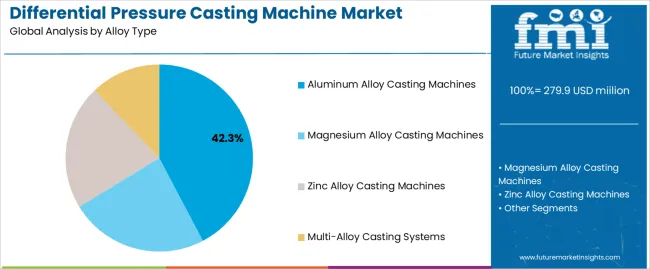
The aluminum alloy casting machines segment is projected to account for 42.3% of the differential pressure casting machine market in 2025, reaffirming its position as the leading product category. Manufacturers and metal forming professionals increasingly utilize aluminum alloy casting machines for their superior light weighting characteristics, established performance standards, and essential functionality in diverse automotive applications across multiple component types. Aluminum alloy casting machines' proven performance characteristics and established cost-effectiveness directly address user requirements for reliable production operation and optimal component precision in commercial applications.
This product segment forms the foundation of modern automotive light weighting strategies, as it represents the technology category with the greatest weight reduction potential and established compatibility across multiple vehicle platforms. Business investments in advanced alloy technology and performance optimization continue to strengthen adoption among efficiency-conscious manufacturers. With users prioritizing component quality and production reliability, aluminum alloy casting machines align with both productivity objectives and performance requirements, making them the central technology of comprehensive manufacturing strategies.
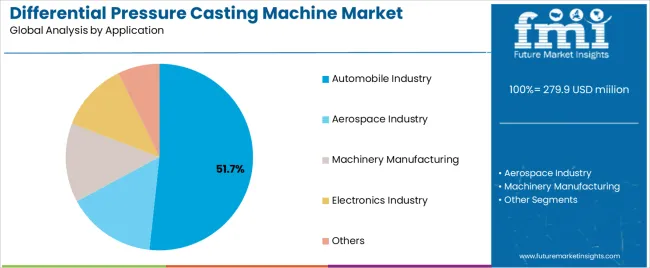
Automobile industry is projected to represent 51.7% of the differential pressure casting machine market in 2025, underscoring its critical role as the primary application for quality-focused manufacturers seeking superior casting efficiency benefits and enhanced production capabilities. Automotive manufacturers and component suppliers prefer automotive applications for their established production volumes, proven market demand, and ability to maintain exceptional component quality while supporting versatile manufacturing requirements during diverse production projects. Positioned as essential applications for performance-conscious manufacturers, automotive offerings provide both operational excellence and competitive positioning advantages.
The segment is supported by continuous improvement in casting technology and the widespread availability of established quality standards that enable performance assurance and premium positioning at the manufacturer level. Additionally, automotive companies are optimizing casting selections to support product differentiation and competitive manufacturing strategies. As casting technology continues to advance and manufacturers seek efficient production methods, automotive applications will continue to drive market growth while supporting business development and customer satisfaction strategies.
The differential pressure casting machine market is advancing rapidly due to increasing light weighting consciousness and growing need for precision manufacturing solutions that emphasize superior performance outcomes across automotive segments and aerospace applications. However, the market faces challenges, including competition from alternative casting technologies, equipment complexity considerations, and capital investment pressures affecting operational economics. Innovation in smart process control integration and advanced materials continues to influence market development and expansion patterns.
Expansion of Automotive Electrification and Light weighting Applications
The growing adoption of differential pressure casting machines in electric vehicle production and light weighting initiatives is enabling manufacturers to develop component strategies that provide distinctive efficiency benefits while commanding competitive positioning and enhanced production characteristics. Automotive applications provide superior weight reduction capabilities while allowing more sophisticated quality control features across various component categories. Users are increasingly recognizing the operational advantages of casting positioning for premium component outcomes and efficiency-conscious production integration.
Integration of Digital Process Control and Smart Manufacturing Systems
Modern differential pressure casting machine manufacturers are incorporating advanced monitoring technologies, digital pressure control systems, and automated quality tracking to enhance production precision, improve equipment longevity, and meet commercial demands for intelligent manufacturing solutions. These systems improve operational effectiveness while enabling new applications, including predictive maintenance programs and process optimization protocols. Advanced control integration also allows manufacturers to support productivity leadership positioning and quality assurance beyond traditional casting operations.
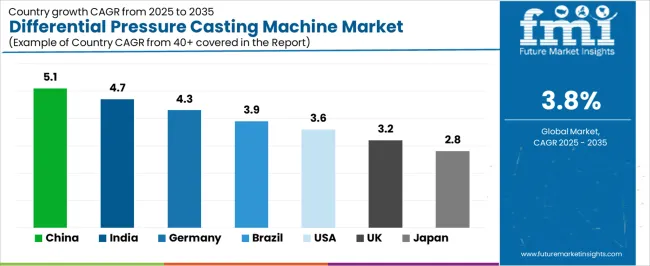
| Country | CAGR (2025 to 2035) |
|---|---|
| China | 5.1% |
| India | 4.7% |
| Germany | 4.3% |
| Brazil | 3.9% |
| USA | 3.6% |
| UK | 3.2% |
| Japan | 2.8% |
The differential pressure casting machine market is experiencing robust growth globally, with China leading at a 5.1% CAGR through 2035, driven by the expanding automotive manufacturing industry, growing demand for lightweight components, and increasing adoption of advanced casting technologies. India follows at 4.7%, supported by rising automotive production, expanding industrial base, and growing acceptance of precision manufacturing solutions. Germany shows growth at 4.3%, emphasizing established automotive capabilities and comprehensive casting technology development. Brazil records 3.9%, focusing on automotive expansion and industrial manufacturing growth. The USA demonstrates 3.6% growth, prioritizing advanced manufacturing technologies and production optimization.
The report covers an in-depth analysis of 40+ countries, the top-performing countries are highlighted below.
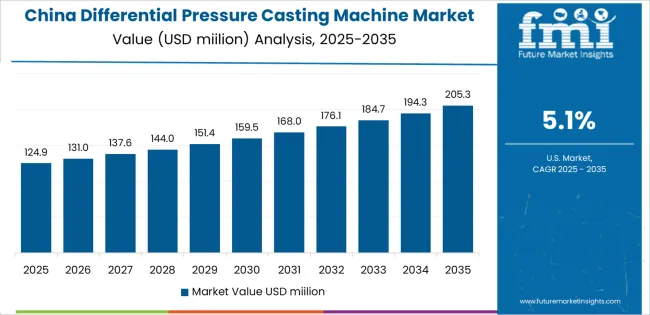
Revenue from differential pressure casting machine consumption and sales in China is projected to exhibit exceptional growth with a CAGR of 5.1% through 2035, driven by the country's rapidly expanding automotive sector, favorable government policies toward manufacturing advancement, and initiatives promoting advanced casting technologies across major industrial regions. China's position as a leading automotive manufacturing hub and increasing focus on light weighting systems are creating substantial demand for high-quality differential pressure casting machines in both domestic and export markets. Major automotive companies and component manufacturers are establishing comprehensive casting capabilities to serve growing demand and emerging market opportunities.
Revenue from differential pressure casting machine products in India is expanding at a CAGR of 4.7%, supported by rising automotive investment, growing industrial development, and expanding manufacturing capabilities. The country's developing automotive sector and increasing commercial investment in advanced casting technologies are driving demand for differential pressure casting machines across both traditional and modern manufacturing applications. International equipment companies and domestic manufacturers are establishing comprehensive operational networks to address growing market demand for quality casting systems and efficient production solutions.
Revenue from differential pressure casting machine products in Germany is projected to grow at a CAGR of 4.3% through 2035, supported by the country's mature automotive sector, established casting standards, and leadership in manufacturing technology. Germany's sophisticated automotive infrastructure and strong support for advanced manufacturing systems are creating steady demand for both traditional and innovative casting varieties. Leading equipment manufacturers and specialty producers are establishing comprehensive operational strategies to serve both domestic markets and growing export opportunities.
Revenue from differential pressure casting machine products in Brazil is projected to grow at a CAGR of 3.9% through 2035, driven by the country's emphasis on automotive expansion, industrial development, and growing manufacturing capabilities. Brazilian manufacturers and automotive companies consistently seek commercial-grade casting systems that enhance production efficiency and support operational excellence for both traditional and modern manufacturing applications. The country's position as a Latin American automotive leader continues to drive innovation in specialized casting applications and commercial equipment standards.
Revenue from differential pressure casting machine products in the USA is projected to grow at a CAGR of 3.6% through 2035, supported by the country's emphasis on manufacturing technology advancement, production optimization, and advanced automation integration requiring efficient casting solutions. American manufacturers and automotive producers prioritize performance reliability and operational precision, making specialized casting systems essential equipment for both traditional and modern manufacturing applications. The country's comprehensive technology leadership and advancing production patterns support continued market expansion.
Revenue from differential pressure casting machine products in the UK is projected to grow at a CAGR of 3.2% through 2035, supported by established manufacturing standards, mature automotive markets, and emphasis on equipment reliability across commercial and industrial sectors. British manufacturers and automotive professionals prioritize quality performance and operational consistency, creating steady demand for premium casting solutions. The country's comprehensive market maturity and established manufacturing practices support continued development in specialized applications.
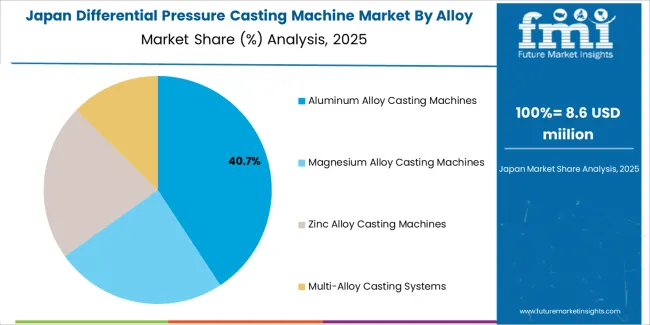
Revenue from differential pressure casting machine products in Japan is projected to grow at a CAGR of 2.8% through 2035, supported by the country's emphasis on precision manufacturing, quality excellence, and advanced technology integration requiring efficient casting solutions. Japanese businesses and automotive producers prioritize technical performance and manufacturing precision, making specialized casting systems essential equipment for both traditional and modern production applications. The country's comprehensive quality leadership and advancing manufacturing patterns support continued market expansion.
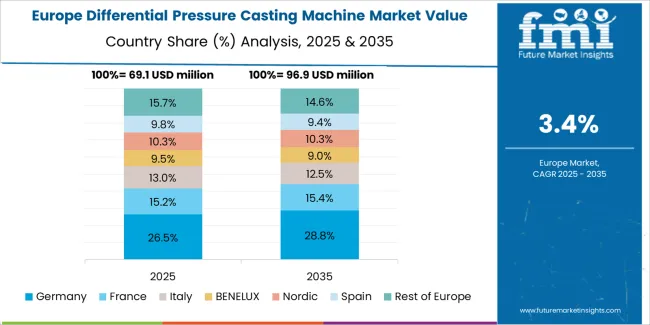
The Europe differential pressure casting machine market is projected to grow from USD 89.6 million in 2025 to USD 128.4 million by 2035, recording a CAGR of 3.7% over the forecast period. Germany leads the region with a 38.7% share in 2025, moderating slightly to 38.2% by 2035, supported by its strong automotive base and demand for premium, technically advanced casting equipment. The United Kingdom follows with 22.1% in 2025, easing to 21.8% by 2035, driven by a mature automotive market and emphasis on equipment reliability and production optimization. France accounts for 15.3% in 2025, rising to 15.8% by 2035, reflecting steady adoption of automated casting solutions and operational efficiency enhancement. Italy holds 11.9% in 2025, expanding to 12.4% by 2035 as automotive production and specialty casting applications grow. Spain contributes 7.2% in 2025, growing to 7.5% by 2035, supported by expanding automotive sector and equipment modernization. The Nordic countries rise from 3.6% in 2025 to 3.8% by 2035 on the back of strong technology adoption and advanced manufacturing methodologies. BENELUX remains at 1.2% share across both 2025 and 2035, reflecting mature, efficiency-focused industrial markets.
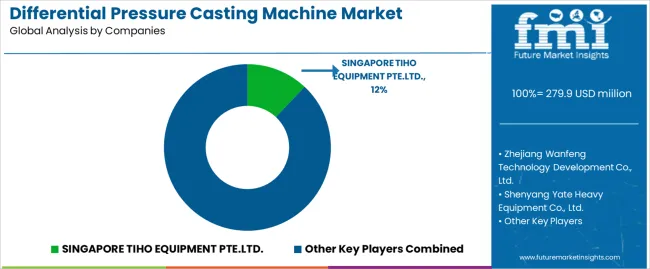
The differential pressure casting machine market is characterized by competition among established equipment manufacturers, specialized casting system producers, and integrated manufacturing solution companies. Companies are investing in precision control technologies, advanced automation systems, product innovation capabilities, and comprehensive service networks to deliver consistent, high-quality, and reliable differential pressure casting machine systems. Innovation in process optimization, control system enhancement, and application-specific product development is central to strengthening market position and customer satisfaction.
SINGAPORE TIHO EQUIPMENT PTE.LTD. leads the market with a strong focus on casting equipment innovation and comprehensive differential pressure casting solutions, offering commercial machine systems with emphasis on manufacturing excellence and technological heritage. Zhejiang Wanfeng Technology Development Co., Ltd. provides specialized casting systems with a focus on industrial market applications and performance engineering networks. Shenyang Yate Heavy Equipment Co., Ltd. delivers integrated manufacturing solutions with a focus on industrial positioning and operational efficiency. Qinhuangdao Hongtong Machinery Co., Ltd. specializes in comprehensive casting equipment with an emphasis on precision applications. Jiangsu Tian Ding Fine Machinery Co., Ltd. focuses on comprehensive industrial casting systems with advanced design and premium positioning capabilities.
The success of differential pressure casting machines in meeting commercial manufacturing demands, production-driven efficiency requirements, and quality integration will not only enhance casting performance outcomes but also strengthen global manufacturing capabilities. It will consolidate emerging regions' positions as hubs for efficient equipment production and align advanced economies with commercial manufacturing systems. This calls for a concerted effort by all stakeholders -- governments, industry bodies, manufacturers, suppliers, and investors. Each can be a crucial enabler in preparing the market for its next phase of growth.
| Items | Values |
|---|---|
| Quantitative Units (2025) | USD 279.9 million |
| Alloy Type | Aluminum Alloy Casting Machines, Magnesium Alloy Casting Machines, Zinc Alloy Casting Machines, Multi-Alloy Casting Systems |
| Application | Automobile Industry, Aerospace Industry, Machinery Manufacturing, Electronics Industry, Others |
| Capacity Range | Small-Scale Machines (up to 500 tons), Medium-Scale Machines (500-1000 tons), Large-Scale Machines (1000-2000 tons), Heavy-Duty Machines (above 2000 tons) |
| Automation Level | Manual Operation Systems, Semi-Automatic Systems, Fully Automatic Systems |
| Regions Covered | North America, Europe, Asia Pacific, Latin America, Middle East & Africa, Other Regions |
| Countries Covered | China, India, Germany, Brazil, United States, United Kingdom, Japan, and 40+ countries |
| Key Companies Profiled | SINGAPORE TIHO EQUIPMENT PTE.LTD., Zhejiang Wanfeng Technology Development Co., Ltd., Shenyang Yate Heavy Equipment Co., Ltd., and other leading differential pressure casting machine companies |
| Additional Attributes | Dollar sales by alloy type, application, capacity range, automation level, and region; regional demand trends, competitive landscape, technological advancements in casting engineering, precision manufacturing initiatives, process optimization programs, and premium equipment development strategies |
The global differential pressure casting machine market is estimated to be valued at USD 279.9 miilion in 2025.
The market size for the differential pressure casting machine market is projected to reach USD 406.4 miilion by 2035.
The differential pressure casting machine market is expected to grow at a 3.8% CAGR between 2025 and 2035.
The key product types in differential pressure casting machine market are aluminum alloy casting machines, magnesium alloy casting machines, zinc alloy casting machines and multi-alloy casting systems.
In terms of application, automobile industry segment to command 51.7% share in the differential pressure casting machine market in 2025.






Full Research Suite comprises of:
Market outlook & trends analysis
Interviews & case studies
Strategic recommendations
Vendor profiles & capabilities analysis
5-year forecasts
8 regions and 60+ country-level data splits
Market segment data splits
12 months of continuous data updates
DELIVERED AS:
PDF EXCEL ONLINE
Differential Scanning Calorimetry Market Size and Share Forecast Outlook 2025 to 2035
Differential Tapes Market Size and Share Forecast Outlook 2025 to 2035
Differential Pressure Switches Market
Automotive Differential Market Size and Share Forecast Outlook 2025 to 2035
Automotive Differential Housing Market Size and Share Forecast Outlook 2025 to 2035
Pressure Switch Market Forecast Outlook 2025 to 2035
Pressure Reducing Valve Market Size and Share Forecast Outlook 2025 to 2035
Pressure-Volume Loop Systems Market Size and Share Forecast Outlook 2025 to 2035
Pressure Transmitter Market Size and Share Forecast Outlook 2025 to 2035
Pressure Monitoring Extension Tubing Sets Market Size and Share Forecast Outlook 2025 to 2035
Pressure Bandages Market Size and Share Forecast Outlook 2025 to 2035
Pressure-Sensitive Adhesives Market Size and Share Forecast Outlook 2025 to 2035
Pressure Gauges Market Size and Share Forecast Outlook 2025 to 2035
Pressure Relief Valve Market Size and Share Forecast Outlook 2025 to 2035
Pressure-Controlled Vacuum Sealers Market Size and Share Forecast Outlook 2025 to 2035
Pressure Sensitive Tapes and Labels Market Size, Share & Forecast 2025 to 2035
Pressure Infusion Bags Market Analysis - Size, Share, and Forecast 2025 to 2035
Pressure Ulcer Detection Devices Market Trends – Growth & Forecast 2025 to 2035
Pressure Cushions Market Trends - Growth, Size & Forecast 2025 to 2035
Pressure Infusion Cuffs Market Growth – Trends & Future Outlook 2024-2034

Thank you!
You will receive an email from our Business Development Manager. Please be sure to check your SPAM/JUNK folder too.
Chat With
MaRIA